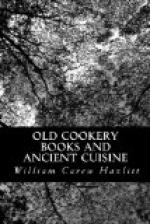Under the name of a Roman epicure, Coelius Apicius, has come down to us what may be accepted as the most ancient European “Book of Cookery.” I think that the idea widely entertained as to this work having proceeded from the pen of a man, after whom it was christened, has no more substantial basis than a theory would have that the “Arabian Nights” were composed by Haroun al Raschid. Warner, in the introduction to his “Antiquitates Culinariae,” 1791, adduces as a specimen of the rest two receipts from this collection, shewing how the Roman cook of the Apician epoch was wont to dress a hog’s paunch, and to manufacture sauce for a boiled chicken. Of the three persons who bore the name, it seems to be thought most likely that the one who lived under Trajan was the true godfather of the Culinary Manual.
One of Massinger’s characters (Holdfast) in the “City Madam,” 1658, is made to charge the gourmets of his time with all the sins of extravagance perpetrated in their most luxurious and fantastic epoch. The object was to amuse the audience; but in England no “court gluttony,” much less country Christmas, ever saw buttered eggs which had cost L30, or pies of carps’ tongues, or pheasants drenched with ambergris, or sauce for a peacock made of the gravy of three fat wethers, or sucking pigs at twenty marks each.
Both Apicius and our Joe Miller died within L80,000 of being beggars—Miller something the nigher to that goal; and there was this community of insincerity also, that neither really wrote the books which carry their names. Miller could not make a joke or understand one when anybody else made it. His Roman foregoer, who would certainly never have gone for his dinner to Clare Market, relished good dishes, even if he could not cook them.
It appears not unlikely that the Romish clergy, whose monastic vows committed them to a secluded life, were thus led to seek some compensation for the loss of other worldly pleasures in those of the table; and that, when one considers the luxury of the old abbeys, one ought to recollect at the same time, that it was perhaps in this case as it was in regard to letters and the arts, and that we are under a certain amount of obligation to the monks for modifying the barbarism of the table, and encouraging a study of gastronomy.
There are more ways to fame than even Horace suspected. The road to immortality is not one but manifold. A man can but do what he can. As the poet writes and the painter fills with his inspiration the mute and void canvas, so doth the Cook his part. There was formerly apopular work in France entitled “Le Cuisinier Royal,” by mm. Viard and Fouret, who describe themselves as “Hommes de Bouche.” The twelfth edition lies before me, a thick octavo volume, dated 1805. The title-page is succeeded by an anonymous address to the reader, at the foot of which occurs a peremptory warning to pilferers of dishes or parts thereof; in other words,




